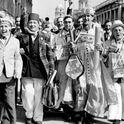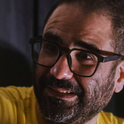Our own dear union
In the department of useless but fascinating projects, that of judging whether the Soviet Union could have evolved into a democracy ranks high. The endeavour might, nevertheless, shed some light on our own dear union.
"If the United Kingdom continues to unravel," the late Raphael Samuel wrote in his Island Stories (1998), "the word Britain may become as obsolete as 'Soviet' in post-1989 Russia." It is a forecast to heed, as the Scots prepare to vote for a new parliament on 6th May. Indeed, it was assumed by almost all democrats-Soviet and foreign alike-that the Soviet Union simply had too little ability to develop a civic society; it had been too oppressive of the multitude of identities which made it up to be able to evolve into a democracy.
The more enthusiastic nationalists and devolvers said much the same about Britain-especially in the 1980s, when the left in Scotland coalesced around radical devolution, and saw the premiership of Margaret Thatcher as a tyrannical imposition. (The most extreme nationalists within Britain, Sinn Fein-IRA, have always believed in the strong version of the oppressive British state.) This rhetoric has been trimmed in the past year, even by some within Sinn Fein's orbit; but now words are becoming deeds, and the election of assemblies all around will show us if separate centres of power will weaken the union, or strengthen it on a new basis.
The left had a vested interest in devolution, and in the weakening of the right's version of unionism. In every one of its manifestations, the nationalisms of these islands has taken a left colouration-from the incoherent liberation-speak of Sinn Fein, through the Celtic socialism of Plaid Cymru, to the Scandinavian-style social democracy of the Scottish nationalists. Even those on the left in the English majority community who had-one would have thought-an interest in stressing the union, were too paralysed by political correctness to talk about it, until now.
What the left has come up with so far has been shallow. Rebranding Britain and Cool Britannia were not bad ideas, but they assumed too much: that we all agreed that pageantry and tradition could be junked, and a new, multicultural and modern identity rapidly put in place. It will need more than that; of the main politicians, only Gordon Brown has so far tried to explore what a new unionism could look like.
The right, although unable to mount a coherent defence of old unionism and constrained to work within the new assemblies, remains unreconciled to new unionism on Labour's terms. But the right is surely correct about one thing: the government has shown a disturbing insouciance in its treatment of "Britain" and "the British"-a treatment echoed in April by the BBC, which sent out guidelines to its reporters and editors steering them away from the use of these words "in case they gave offence."
What offence? Britishness did not supplant other identities in the way that French nationalism did; it was, and is, possible to have Scots-British, Welsh-British and other hyphenated identities. Nor did it exclude others from citizenship because of blood, as the Germans still do. At the core of its imperialism, flummery and reaction was the glimpse of citizenship; the best of New Labour resides in stripping away the pageantry and getting at the citizenship.
Arthur Aughey, the Northern Irish political scientist, puts it thus in a recent collection of essays on Britishness: "Britishness involves an idea of the people and of its identity quite different from that of nationalism. The unionist formula proposes that the sovereign people is the constitutional people... It is not Britishness as some peculiar spiritual substance or ethnic identity which defines the United Kingdom."
The Scots, with few exceptions, have not been queuing up to acknowledge the legitimacy of our constitutional arrangement; instead, they have been paying it the compliment of taking it for granted -a compliment, however, which carries the danger that they will not care for it when it needs attention. Is it possible that, up and running, the Scots parliament will realise it is part of a larger citizenship, and seek to strengthen its grain?
A civics lesson
War, as Robert Cooper observed in the last issue of Prospect, drives innovation; and the war, or the threat of its resumption in Northern Ireland, has driven the most extraordinary political change in the province. For the first time since its formation, the Ulster Unionist party-or that part of it headed by David Trimble-holds out the promise of a civic unionism to protestants and catholics alike.
It is an irony that at the time of writing the IRA has refused yet again to decommission, citing the continued "protestant veto" as a stumbling block. There had been something which might have been described as a protestant or unionist veto in Northern Ireland-a dull, stubborn refusal to recognise catholics as fellow citizens because of a fear that it would weaken the defence of the union. But 30 years of terrorism have whittled that away. What is left, under Trimble, is a unionism which is at least formally indifferent to whether a citizen is unionist or nationalist, as long as he or she is a citizen. What the IRA is left with as a definition of the protestant veto is protestant existence, in larger numbers than catholics.
Civic unionism has appeared late on the Northern Irish stage. Too late? Hopefully not. What is still regarded in sophisticated circles as the most backwoods political group in these islands is showing us how conflict can concentrate even narrow minds. We could all learn a civics lesson from it.











